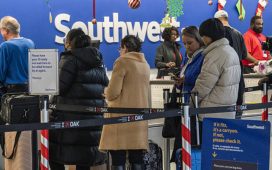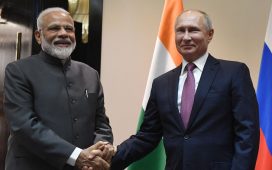Exit poll suggests Labour has won 410 seats, and the Tories 131
Clive Myrie is reading out the exit poll.
Conservatives: 131
Labour: 410
Liberal Democrats: 61
SNP: 10
Reform UK: 13
Plaid Cymru: 4
Greens: 2
Key events
How reliable are exit polls?
Broadcasters have been commissioning exit polls since the 1970s and in the past there have been some spectacular misses. In October 1974 a BBC exit poll said Labour would win by a landslide, when in fact Harold Wilson won by a tiny majority. In 1987 the BBC and ITV (which produced rival exit polls in those days) both badly underestimated how big Margaret Thatcher’s majority would be, and they both forecast a hung parliament in 1992 when John Major won a small majority.
But in 2005 the methodology changed, and since then exit polls have generally been very accurate. Prof Sir John Curtice is in charge of the team and the work is jointly commissioned by the BBC, ITV and Sky News. Of the five previous exit polls calculated using this method, two got the majority exactly right, two were out by less than 10, and one was out by 22. Here are the details.
2005 – accurate: It predicted a Labour majority of 66, which was correct.
2010 – accurate: It said the Conservatives would be 19 seats short of a majority, and they were.
2015 – out by 22: It said the Conservatives would be 10 seats short of a majority, but they got a majority of 12.
2017 – out by 4: It said the Conservatives would be 12 seats short of a majority, but they were eight seats short.
2019 – out by 6: It forecast a Tory majority of 86, but it was 80.
There is more on how the exit polls works on this Channel 4 News fact check blog.
Labour heading for majority of 170, exit poll suggests
If these figures are accurate, Keir Starmer will have a majority of 170.
Here are the full figures, showing how many seats each party has gained and lost.
Exit poll suggests Labour has won 410 seats, and the Tories 131
Clive Myrie is reading out the exit poll.
Conservatives: 131
Labour: 410
Liberal Democrats: 61
SNP: 10
Reform UK: 13
Plaid Cymru: 4
Greens: 2
Clive Myrie is opening the BBC’s election night coverage. He is co-presenting with Laura Kuenssberg.
Oliver Dowden among five Tories getting knighthoods and damehoods in dissolution honours
No 10 has also announced knightoods for four Tories in the dissolution honours – Oliver Dowden, the deputy PM; Julian Smith, the former chief whip and Northern Ireland secretary; Ben Wallace, the former defence secretary; and Alister Jack, the outgoing Scottish secretary – and one damehood, for Thérèse Coffey, the former deputy PM.
As Michael Savage from the Observer reports, Jack had been tipped for a peerage,
At the weekend, I reported that Alister Jack was in line for a peerage. Tonight, Sunak has revealed a dissolution honours list in which he has been given a knighthood…
Also a knighthood for Oliver Dowden, the deputy PM who pushed for the early election.
— Michael Savage (@michaelsavage) July 4, 2024
There are many memorable moments on election night, but it is hard to beat hearing the exit poll being read out. For those actively involved in the campaign, this is the moment of agony or joy. It’s coming soon.
For years David Dimbleby read the results out on the BBC. As a broadcaster, it is one of the biggest tasks you can be given. But, surprisingly, Dimbleby thinks exit polls are a bit of a waste of time, and that they spoil the drama. This is what he writes about them in his memoir, Keep Talking.
The glory of a British election is that 650 constituencies have to give their result individually and do so within a few hours of the polls closing. So what is the point of exit polls? As they become more accurate they drain the drama from the night, like revealing the denoument of what should be a play in five acts. I see no point in spending money predicting what is going to happen in a few hours’ time rather than waiting for it to happen. The exit poll adds nothing and spoils the fun. If it is accurate and is confirmed by the actual results it makes the reality a dull affair, simply confirmation of what has been predicted.
Full list of people getting peerages in dissolution honours list
And here is the full list of people getting peerages in the dissolution honours list.
Nominations from Conservative party
Sir Graham Brady, outgoing chair of the 1922 committee
Chris Grayling, who served in cabinet as transport secretary, justice secretary and leader of the Commons
Eleanor Laing, former deputy speaker of the Commons
Craig Mackinley, the former MP for South Thanet who returned to the Commons recently having had his hands and feet amputated due to sepsis
Theresa May, the former PM
Alok Sharma, the former Cop26 president and former business secretary
Liam Booth-Smith, who has been Rishi Sunak’s chief of staff.
Nominations from Labour party
Margaret Beckett, former foreign secretary, former deputy Labour leader, and acting leader between the death of John Smith and the election of Tony Blair
John Cryer, a former chair of the parliamentary Labour party (PLP)
Harriet Harman, a former deputy Labour leader and acting leader between the resignation of Ed Miliband and the election of Jeremy Corbyn
Margaret Hodge, a former culture minister and former chair of the public accounts committee
Kevan Jones, a former defence minister
Barbara Keeley, a former deputy leader of the Commons
John Spellar, a former whip
Rosie Winterton, a former deputy speaker
Nomination from the Liberal Democrats
Caroline Pidgeon, former Lib Dem leader in the London assembly
Nomination from the Ulster Unionist party
Thomas Elliott, former UUP leader
Nominations for crossbench peerages
Minette Batters, former president of the NFU
Dr Hilary Cass, former president of the Royal College of Paediatrics and Child Health and chair of the recently-published review into gender identity services for children and young people
With just half an hour until the results of the exit poll are out, the opinion polls have consistently put Labour on course for a victory with one of the largest ever parliamentary majorities. Conversely, the Conservatives are projected to suffer one of its worst ever losses.
Here’s how the prediction of a dramatic Labour win compares with other landslide victories in British history.
Theresa May and Graham Brady given peerages in surprise dissolution honours list
Downing Street has made the surprise decision to release a dissolution honours list tonight. It includes peerages for the former prime minister Theresa May and former chairman of the Conservative backbench 1922 committee Sir Graham Brady.
Earlier this week we reported that Rishi Sunak was worried about losing his seat. He represents Richmond and Northallerton in Yorkshire, where at the last election (when the seat was called Richmond, and the boundaries were slightly different) he had a majority of 27,210.
Like almost every other candidate, Sunak may have been taking a look at this website, created by the Oxford University data scientist Peter Inglesby. It aggregate all the MRP polls carried out during the campaign, as well as other forecasts from election models, and shows what they are predicting for every seat in the country. Of the 14 models included, 12 of them have Sunak holding his seat (with varying degrees of certainty) and two of them have Labour on course to win there.
This is from the BBC’s Victoria Derbyshire, who is outside the PM’s constituency home in Yorkshire.
Even if nothing much happens, in news terms, on polling day until 10pm, it is a glorious day for those who cherish our democracy. Esther Addley captures what has been happening here. And, yes, it features dogs at polling stations.
Election results night: opening summary

Andrew Sparrow
Good evening. Britain’s first past the post (FPTP) electoral system is flawed in many respects – it is not fair to small parties, it means many people feel that their votes never count, it does not guarantee stable governments – but in one respect at least it performs brilliantly. When the nation is truly fed up with a government, and when the public is determined to “throw the rascals out”, FPTP delivers. As in 1906, or 1945, or 1997, it can lead to an unpopular governing party being crushed by a landslide that reshapes the political landscape. We’re expecting another tonight.
There is no particular mystery about why the Conservative party is on course to lose so badly. Last month Cambrige University Press published a new book about the record of the party in government over the past 14 years. It concluded that, measured by its performance, this has been the worst government in postwar history. Nobody has seriously tried to argue that this assessment is wrong.
And there does not seem to be anyone in the political world who is not expecting a Labour landslide victory tonight. Election nights often produce surprises, but they came in two categories. Some elections produce an unexpected shock (like John Major winning in 1992, or David Cameron getting an outright majority in 2015, or Theresa May throwing it away in 2017.) But there are also elections that produce an expected shock; a result that that is in line with what pollsters were predicting, but yet is still a surprise because the numbers seemed too outlandish to be true. This happened in 1997, when hardly anyone believed regular polls suggesting Tony Blair was on course for a majority heading for the 200 mark (including the papers that paid for them). And it seems likely to happen again tonight.
But there is still huge uncertainty as to how well Labour might do. The Elections Etc website has published a round-up of the different results forecast by different methods (simple modelling, based on opinion polls; more complex modelling based on the same polls; MRP polls; and the betting markets). On average these models are predicting a Labour majority of 194. The lowest projected figure for the Labour majority (from simple model forecasting) is 88.
But pollsters regard their MRP surveys as particularly reliable, and the numbers these polls are producing are astonishing. Here is the summary from Elections Etc.
Some of these predictions are certain to be very badly wrong. (There is a big difference between Labour getting a majority of 210 and 382.) Perhaps the MRP pollsters have all got it wrong? But, as we go into election night, they have created an extraordinary situation where Keir Starmer could end up with a majority of 100, which would still be a landslide, or even 150 – an astonishing result for a party that lost very badly less than five years ago – and still feel a tad disappointed.
Anyway, we will have a much better idea at 10pm, when the results of the exit poll are out. For the last 20 years it has mostly been very reliable. And by tomorrow we will know for sure. Unless election 2024 has produced the greatest failure since people started trying to measure electoral opinion in the democratic age, Keir Starmer will become prime minister (around lunchtime?) and he will start forming a new government.
Here is an hour-by-hour guide to what results we are expecting an when.
And here is a guide from Rob Ford, a psephologist, to the trends we should be looking out for.
I’m Andrew Sparrow and I’ll be blogging through the night with Léonie Chao-Fong. We will be covering results here, but we also have a seperate results page here. And of course we will be bringing you reaction and analsyis into the night and all through Friday. I am unlikely to have much time to look at the comments tonight but if you want to flag something up to me, try using X; I’ll see something addressed to @AndrewSparrow very quickly.








